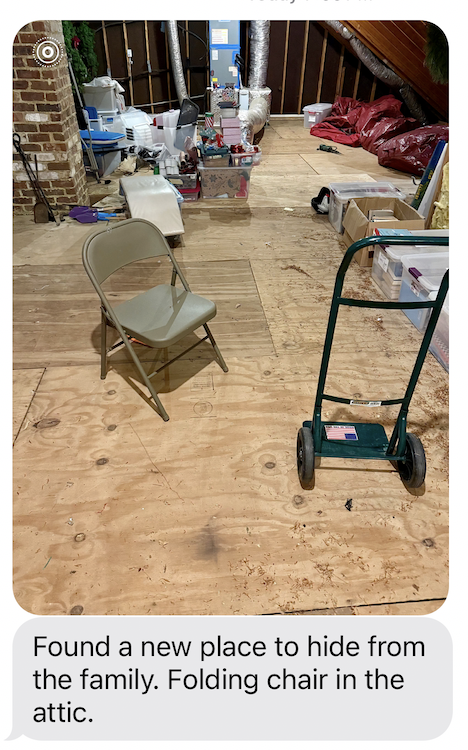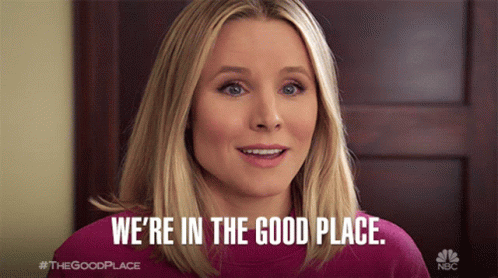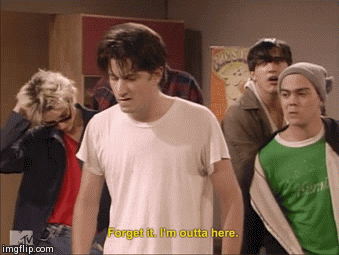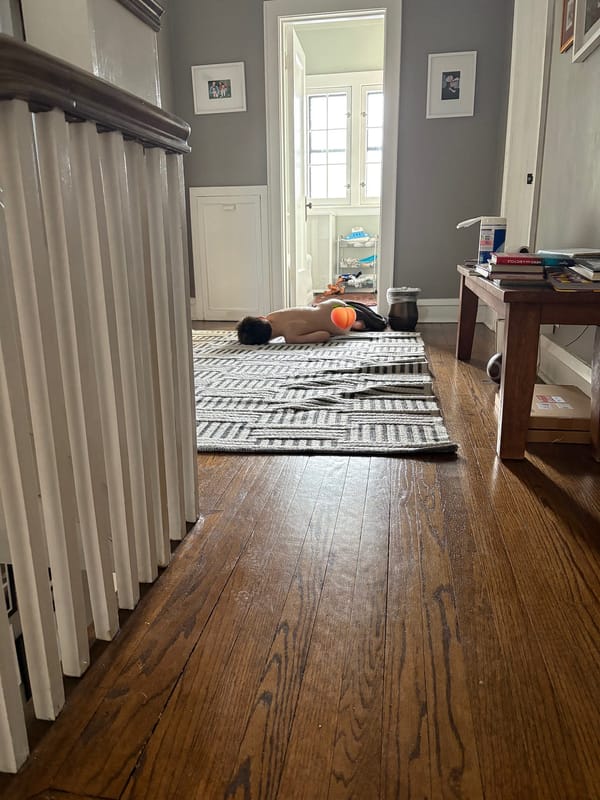Doctor ➡️ Doctor Mom
What motherhood does to your practice
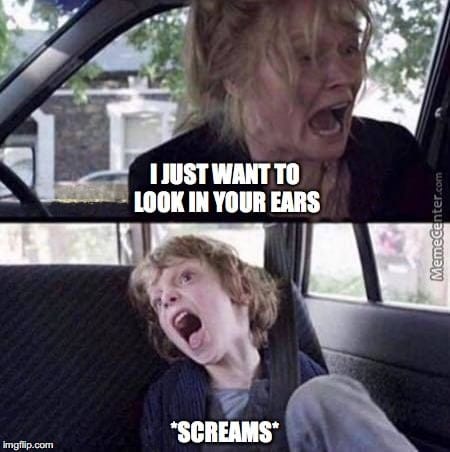
Recently, for a corporate gig, I interviewed a man who told me that he was married to a pediatrician and that they also had a young child. I realized what a perspective change it must be to start off your pediatric career with no kids and then become a parent.
So that’s what today’s issue is about: speaking with three women who became moms after they had already begun their career in pediatrics about what impact that had on how they do their jobs. I was curious to know what changes between learning about milestones in med school vs. your own human child not giving a shit about when and if milestones are reached.
These (condensed, edited) interviews do touch on serious child illness, so please skip this one if that’s not what you want in your brain today.
C, a pediatrician and developmental behavioral pediatrics fellow in the Midwest:
Who am I to say your child should sleep from 9:00 P.M. to 9:00 A.M.?
When you were pregnant, how much did your knowledge as a pediatrician affect your birth plan?
With my second-born, I went into labor a day ahead of the scheduled C-section for a breech delivery. I got to the hospital, and they’re like, “Well, would you like us to try and flip him?” I was like, “Absolutely not. Get this show on the road.”
A nurse was pressuring me to do a VBAC. She was like, “You could damage your ureters and you wouldn’t be able to urinate the rest of your life normally.”
I said, “True, but part of the risk of a VBAC after you’ve had a C-section is uterine rupture if things aren’t going well. The baby can lose blood supply completely and have neurological devastation for the rest of their life.” Having taken care of kids who had had that experience, I didn’t want to put my child at risk for that. I felt appreciative of the experiences and training I had, confident in the decision I was making, and sad for someone who may not have had that experience or the ability to self-advocate.
The funny part was 10 minutes later, she was like, “Oh, what do you do?” I was like, “I’m a pediatric hospitalist.” She’s like, “Oh.” Then she stopped.
Was there anything in particular that you used to advise parents early on in your career that your own kids showed you that maybe there were things you hadn’t learned all the nuances of?
Breastfeeding. Yes, as a pediatrician, 100% I support breastfeeding, but it is so hard. I remember before I had kids, not grasping how hard it was. How much pressure women put on themselves to be successful at it.
My second-born was a fussy baby. I couldn’t put her down, and I was so tired. After I had gone back to work, I saw these moms who I could tell were having such a hard time. I said, “Breast milk or formula. What your baby needs is food and love. That’s all. However you get that food in them, it doesn’t matter.” There’s so much pressure, and I don’t think you fully grasp that until you’ve lived it. If it’s not going well and she’s having such a hard time and is putting so much pressure and guilt on herself that she’s not even able to bond with her baby, then what are we doing?
What are some things lay parents worry about or don’t worry about that your training gives you a different view of?
My husband and I would joke about stuff that he would be worried about, like a rash. I’d be like, “It’s fine.” Then stuff that he didn’t see, I was like, “Oh my gosh, this is going to turn into meningitis.”
Sometimes your mind goes to your worst-case experiences that you had. Our oldest has celiac, and he started having symptoms when he was in preschool. In our training program, we took care of a lot of kids with neuroblastoma. So when he started having symptoms, which predominantly were vomiting, I was fixated on that, to the point that it was like blinders. I wasn’t even thinking celiac. Then one of my siblings asked, “Did they check for celiac? ” So then we asked to add that on, and his levels were sky-high.
Is there anything where you might have been a little bit more stringent about in terms of advising your patients on, but then after having raised these kids, you’re like, “Well, you know what, it’s not that big a deal”?
The sleep training. If you’re not in the headspace to do it, or don’t have a partner on board with it, then why do it right now? This is versus in residency, where you’re like, “You could start sleep training as early as four to six months.”
You have to be sensitive to what matters to the family. I always communicate, advocate and stand behind the safe sleep guidelines, while also trying to understand a family’s background and culture. I can give ideas and recommendations, but if it doesn’t align with what you want, then it’s not going to work.
I’ve had families where the mom or the dad works like a night shift, and this may not work forever, but their child was kind of matching their night shift, and it worked for them because they weren’t school age yet, so they were still getting the right amount of sleep. Yes, when we get to school age, we’re going to have to make some shifts, but who am I to say your child should sleep from 9:00 P.M. to 9:00 A.M.?
Anonymous: A pediatric critical care doctor
The mind-destroying monotony of the first 12 weeks of my child’s life was a surprise and was not a good fit for my personality.
Did you give birth in the hospital? Was it a completely different side of things, being the patient in the hospital?
Yes, I absolutely delivered at a hospital with the highest level NICU available. I’m not a great patient. I don’t think a lot of doctors are great patients. I ask a lot of questions, and I know what I want. They had a hard time putting in an IV, and after literally 12 attempts by the nurses on the floor, they were like, “Well, everyone on our unit has already tried.” I was like, “Okay. Well, these are the people who I know are working tonight who you should call.”
Was there anything about having a child that caught you off guard or changed your perspective about what you know?
The biggest advantage that I had going into having a newborn was that I was very familiar with what sleep deprivation felt like, and how I do or do not function when sleep deprived and the warning signs of I’m too sleep-deprived. Because that’s what training was: being perpetually sleep deprived. Obviously, it’s not exactly the same as having a newborn, but I was able to say every night, I need to sleep for four hours because I can do it, I can get by with that.
Despite that, the depths of it were more than I expected. The mind-destroying monotony of the first 12 weeks of my child’s life was a surprise and was not a good fit for my personality or my capabilities as a human being.
People talk about mommy brain. I did not expect that to be as substantial as it was. I rely on my brain a lot. It is very important to me. It is the foundation of my job. There were times after I went back to work where I knew what I wanted to do, caring for a patient, but I couldn’t find the words. I was spending four sentences describing it. That was a frustrating and scary place to be that I hadn’t fully wrapped my brain around.
What is it like to work with your child’s pediatrician?
This is ridiculous: We met with seven different pediatricians before settling on one. Then my child was born and had some feeding difficulties, and the one that we had picked out was zero help and made some judgmental comments, and I was like, “I’m done. No.” We ended up in a sick visit with someone else in the practice, and she was much more straightforward and thoughtful in the way that she approached things. So she’s the one we’ve continued to see.
You told me earlier about working with parents who are against vaccines, even when it’s life or death. In the show The Pitt, Noah Wyle’s character didn’t mask his frustration with parents who made that choice. Are you ever tempted to show your true feelings when they’re putting their child at risk?
You have to be very thoughtful in the way that you try to have that conversation. They want what is best for their child, but they are so consumed by what they’ve been told and what they’re fearful of that they can’t see the reality in front of them. They care very much about protecting their child, and they are so scared and so misinformed and don’t understand the reality of the situation because of what they’ve been exposed to. Me yelling at them isn’t going to solve the problem.
, a writer, public health leader and program director who saw pediatric patients up until 2019:
“You know what? Let’s maybe let go of the attachment that we have to breastfeeding.”
How did becoming a mom change how you viewed working with parents and kids?
It feels like knowing the safety dos and don’ts, reading a flight manual, knowing it from beginning to end, vs actually flying a plane. Everything from dealing with a sleep regression, dealing with a tantrum that doesn’t respond to so-called textbook interventions, and dealing with attachment issues: you realize that there’s much more gray area than we allow for in medical guidelines.
I live with bipolar disorder. I became a new parent with this clear set of things that I wanted to do because I’d been trained as a pediatrician. One of those was breastfeeding, and my psychiatrist had to work on me for several months to say, “You know what? Let’s maybe let go of the attachment that we have to breastfeeding. Let’s think about other options that will to serve you and your child better in the long run.” It was an interesting process for me to look at the data, sit and come to terms with where these recommendations are coming from, if not from the data.
It’s this premise that martyrdom and sacrifice are part and parcel of motherhood. Being uncomfortable, putting yourself at risk, being in a position where you’re the only parent who’s waking up every two to three hours to feed your baby: That’s what we consider normative for the early parenthood or early mothering experience.
But I realized that we end up putting so much of the onus on parents to parent in a very specific way where we create the sense that if you don’t adhere to these rigid standards that we’ve created, that you’re going to be a bad parent, that your child is going to suffer. When you get down to it, some of the recommendations are well-worn out by evidence, and some of them are less well so, but they’re still adhered to as strictly.
One example of that is, in the last 20 years, initially we thought that avoiding peanuts and other allergens in that early feeding period would avert food allergies. Then a bunch of randomized data came in, and we learned the exact opposite was true, and now early introduction is favored.
However, if you look at the very long list of foods that pose a choking hazard when a kid first starts to start on solids, peanut butter is on that list. So you end up putting parents in this difficult position where there is no right way to do most things in parenting.
We’re creating this whole generation of kids and parents who are super anxious and super risk-averse to the detriment of child resilience and development. We’re completely unable to tolerate our children’s frustration or distress. It makes us interfere with them figuring stuff out for themselves in a way that’s going to make them feel independent and self-confident for the long run and resilient to stressors that come throughout their lives.
What I’m starting to understand is that some of my training and a lot of the impulses that pediatrics has as an institution are impairing parents’ abilities to feel confident and competent in their own parenting.
After you had your kid and you maybe got your feet under you a little bit and you were back at work, did you relate to the parents in a different way?
I have much more empathy and understanding for where they’re coming from. Maybe there was a part of me when I first started practicing pediatrics that felt like when you see a dysregulated child or a dysregulated adult interacting with a child in public, there was a piece of hubris in me that felt like “If you had been trained in the right modalities, then you would not be in this circumstance.” The truth of the matter is every parent and every child is going to have moments where they’re dysregulated, whether that’s in public or in private. There’s much more uncertainty in real-life parenting than there is in the ideal sense when you’re getting trained in it.
Was there anything about new parenthood where you thought that you had kind of hacked it ahead of time, but then you were like, “This child does not know the graph says this yey he’s doing that?”
When my child first had a sleep regression at four months, I took it very personally. I knew that it was a possibility and it was probably going to come at some point, but he had started to sleep so freaking well through the night that it was a very rude awakening when he was getting up every 30 minutes.
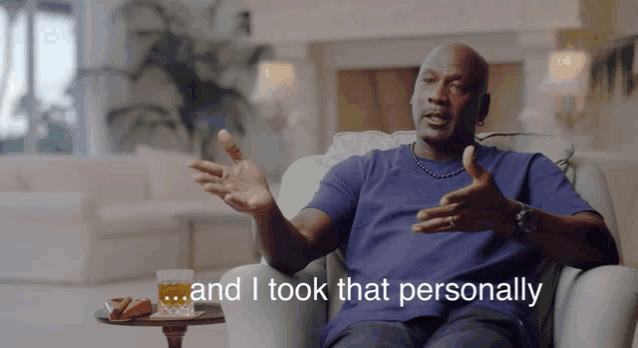
End credits
Thank you for reading Evil Witches, a newsletter for people who happen to be mothers. I am supposed to give you a long spiel here convincing you of the value of this publication and show you some excellent former issues you missed, but this is me lately:
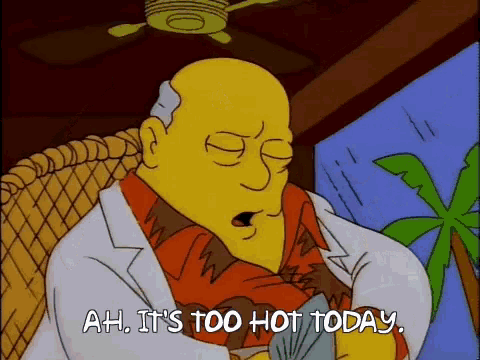
So let’s skip it. But if you do decide to become a paid subscriber to support this work and to become not just a reader but a member, that would be very ❄️COOL.❄️
One witchy thing
